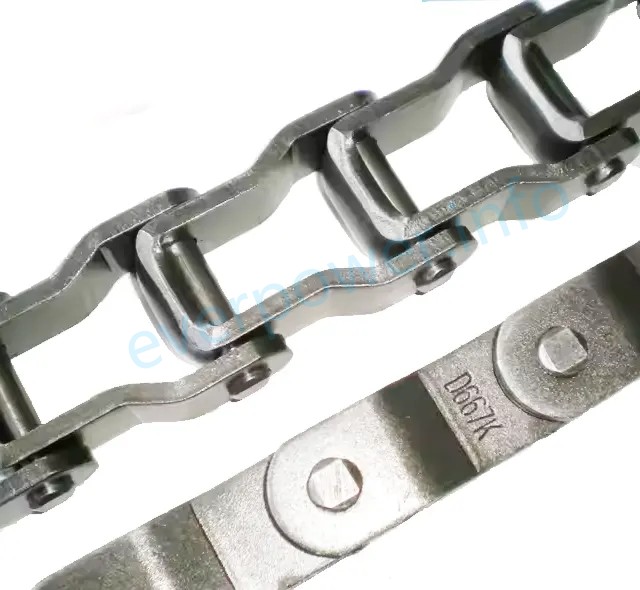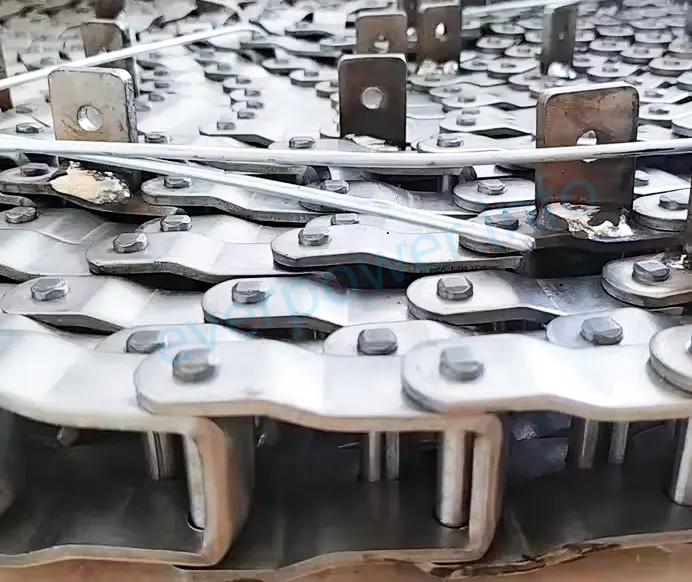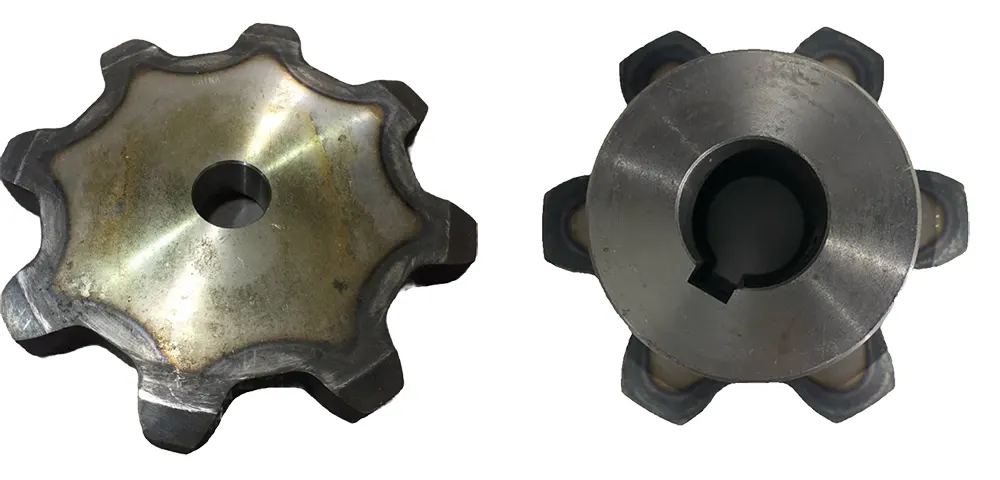Einführung
In the world of industrial chains, the choice of material is crucial for ensuring optimum performance and longevity. One material that stands out for its exceptional corrosion resistance is stainless steel. In this article, we will explore how the corrosion resistance of stainless steel pintle chains compares to other materials.
The Importance of Corrosion Resistance
Corrosion can have a detrimental effect on the performance and lifespan of chains. It can weaken the material, leading to premature failure and increased maintenance costs. Therefore, selecting a chain material with high corrosion resistance is essential for industries operating in harsh environments.
Understanding Stainless Steel Pintle Chains
Stainless steel pintle chains are specifically designed to withstand corrosive conditions. These chains consist of interconnected links, or pintles, that form a continuous loop. The use of stainless steel as the base material provides excellent resistance to corrosion, making it ideal for applications where chains are exposed to moisture, chemicals, or extreme temperatures.
Comparing Stainless Steel with Other Materials
1. Carbon Steel Chains
Carbon steel chains, although widely used, are more vulnerable to corrosion compared to stainless steel pintle chains. Carbon steel chains require regular maintenance and protective coatings to prevent corrosion. In contrast, stainless steel pintle chains offer inherent corrosion resistance, reducing the need for frequent maintenance.
2. Zinc-Plated Chains
Zinc-plated chains provide some level of corrosion resistance by applying a thin layer of zinc onto the surface. However, this protective layer can wear off over time, leaving the chain susceptible to corrosion. Stainless steel pintle chains, on the other hand, offer long-lasting corrosion resistance without the need for additional coatings.
3. Galvanized Chains
Galvanized chains are coated with a layer of zinc, providing moderate corrosion resistance. However, the coating may not be able to withstand highly corrosive environments. Stainless steel pintle chains, with their inherent resistance to corrosion, outperform galvanized chains in harsh conditions.
4. Plastic Chains
Plastic chains are known for their resistance to chemicals and moisture. However, they may not be suitable for heavy-duty applications where high strength and durability are required. Stainless steel pintle chains combine corrosion resistance with robustness, making them a superior choice for demanding industrial environments.
Conclusion
When it comes to corrosion resistance, stainless steel pintle chains surpass other materials commonly used in industrial applications. Their inherent resistance to corrosion, coupled with high strength and durability, makes them an excellent choice for industries operating in harsh and corrosive environments. By choosing stainless steel pintle chains, businesses can ensure reliable performance, reduced maintenance costs, and extended chain lifespan.



Sprockets for Stainless Steel Chains
When it comes to selecting the right chain and sprocket combination for your application, it's important to consider the material's resistance to corrosion. Stainless steel pintle chains are an excellent choice for applications that require high levels of corrosion resistance. Compared to other materials, stainless steel can withstand harsh environments with ease, making it ideal for industries such as food processing, pharmaceuticals, and marine applications.
At our company, we offer a variety of sprockets for stainless steel chains. Our sprockets are made from high-quality materials and are designed to meet the unique needs of each application. Whether you need a standard sprocket or a custom design, we have the expertise and experience to deliver the right solution for your needs.
Our sprockets are made from a variety of materials, including stainless steel, carbon steel, and plastic. Each material has its unique advantages, and we can help you choose the right one for your application. For example, stainless steel sprockets are ideal for applications that require high levels of corrosion resistance, while plastic sprockets are perfect for applications that require low noise levels or where chemical resistance is essential.
No matter what type of sprocket you need, we have the expertise and experience to deliver the right solution for your application. Contact us today to learn more about our sprockets for stainless steel chains.

Why Choose Our Stainless Steel Pintle Chains?
When it comes to choosing pintle chains, the corrosion resistance of the material is a major concern. Stainless steel pintle chains, in particular, are known for their superior corrosion resistance compared to other materials such as carbon steel or plastic. At RP Techniek BV, we take pride in offering high-quality stainless steel pintle chains that are designed to withstand even the most corrosive environments.
Our pintle chains are made from high-grade stainless steel, which offers excellent resistance to corrosion, heat, and abrasion. This means that our chains can withstand exposure to harsh chemicals, moisture, and extreme temperatures without losing their strength or reliability. As a result, our chains are ideal for use in a wide range of industries, including food processing, chemical processing, and wastewater treatment.
At RP Techniek BV, we are committed to providing our customers with the best possible products and services. As the authorized sales agent for Ever-power Group in the Netherlands, we are proud to offer a wide range of high-quality stainless steel roller chains, including pintle chains, conveyor chains, and more. Our experienced team of professionals is dedicated to ensuring that our customers receive the right products for their specific needs, and we are always available to provide expert advice and support.
In summary, if you are looking for high-quality, corrosion-resistant stainless steel pintle chains, look no further than RP Techniek BV. With our extensive selection of products and our commitment to customer satisfaction, you can trust us to provide the best possible solutions for your business needs.

How Does the Corrosion Resistance of Stainless Steel Pintle Chains Compare to Other Materials?
Einführung
In the world of industrial chains, the choice of material is crucial for ensuring optimum performance and longevity. One material that stands out for its exceptional corrosion resistance is stainless steel. In this article, we will explore how the corrosion resistance of stainless steel pintle chains compares to other materials.
The Importance of Corrosion Resistance
Corrosion can have a detrimental effect on the performance and lifespan of chains. It can weaken the material, leading to premature failure and increased maintenance costs. Therefore, selecting a chain material with high corrosion resistance is essential for industries operating in harsh environments.
Understanding Stainless Steel Pintle Chains
Stainless steel pintle chains are specifically designed to withstand corrosive conditions. These chains consist of interconnected links, or pintles, that form a continuous loop. The use of stainless steel as the base material provides excellent resistance to corrosion, making it ideal for applications where chains are exposed to moisture, chemicals, or extreme temperatures.
Comparing Stainless Steel with Other Materials
1. What is the difference between carbon steel chains and stainless steel pintle chains?
Carbon steel chains, although widely used, are more vulnerable to corrosion compared to stainless steel pintle chains. Carbon steel chains require regular maintenance and protective coatings to prevent corrosion. In contrast, stainless steel pintle chains offer inherent corrosion resistance, reducing the need for frequent maintenance.
2. How do zinc-plated chains compare to stainless steel pintle chains in terms of corrosion resistance?
Zinc-plated chains provide some level of corrosion resistance by applying a thin layer of zinc onto the surface. However, this protective layer can wear off over time, leaving the chain susceptible to corrosion. Stainless steel pintle chains, on the other hand, offer long-lasting corrosion resistance without the need for additional coatings.
3. What is the difference between galvanized chains and stainless steel pintle chains in terms of corrosion resistance?
Galvanized chains are coated with a layer of zinc, providing moderate corrosion resistance. However, the coating may not be able to withstand highly corrosive environments. Stainless steel pintle chains, with their inherent resistance to corrosion, outperform galvanized chains in harsh conditions.
4. What are some advantages of stainless steel pintle chains over plastic chains?
Plastic chains are known for their resistance to chemicals and moisture. However, they may not be suitable for heavy-duty applications where high strength and durability are required. Stainless steel pintle chains combine corrosion resistance with robustness, making them a superior choice for demanding industrial environments.
Conclusion
When it comes to corrosion resistance, stainless steel pintle chains surpass other materials commonly used in industrial applications. Their inherent resistance to corrosion, coupled with high strength and durability, makes them an excellent choice for industries operating in harsh and corrosive environments. By choosing stainless steel pintle chains, businesses can ensure reliable performance, reduced maintenance costs, and extended chain lifespan.



Edited By Zqq.
